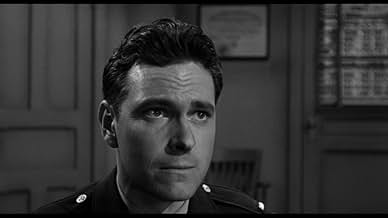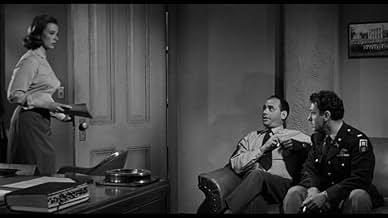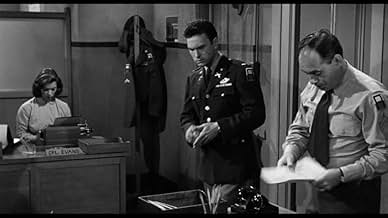During the Korean War former prisoner of war, Major Harry Cargill admits to having collaborated with the enemy but military investigator Colonel William Edwards wants the details.During the Korean War former prisoner of war, Major Harry Cargill admits to having collaborated with the enemy but military investigator Colonel William Edwards wants the details.During the Korean War former prisoner of war, Major Harry Cargill admits to having collaborated with the enemy but military investigator Colonel William Edwards wants the details.
- Nominated for 1 BAFTA Award
- 1 nomination total
- Col. Kim
- (as Kaie Deei)
- Gus
- (as Joe Di Rida)
- Poleska
- (as Skip McNally)
- Prisoner of War
- (uncredited)
- Prisoner of War
- (uncredited)
Featured reviews
But Cargill refuses to tell Widmark's Colonel William Edwards WHY. And he doesn't seem to care he could be, heck, probably will be executed for treason without some defense. With Cargill's past stellar military record, including in WWII, Edwards will not finish this investigation until he gets a "why". But Cargill has talked to nobody about why he did what he did - not even his wife. And Colonel Edwards is being pressured by his superior, a General whose son died in the same POW camp that Cargill was in, and even by Martin Balsam as a particularly irritating sergeant, to recommend prosecution and wash his hands of the matter.
And then Edwards notices that the descriptions of the back-to-back deaths of two soldiers in the POW camp the day before Cargill seemed to turn traitor are identical - as in word for word each time by each soldier. Is there a Manchurian Candidate situation going on here, or something else entirely? The plot twist at the end is the farthest thing from a gimmick, and is infinitely better presented and far less Hollywoodish than the sanctimonious speech by Jose Ferrer at the end of The Caine Mutiny, although I like that film too, for different reasons.
Check it out if you get the chance. WWII films always seem to get the spotlight, but this one is a forgotten jewel about a forgotten war.
Richard Widmark is acting as an investigative officer for the Judge Advocate General's Office trying to ascertain if there are enough facts to bring Richard Basehart to trial for treason. Basehart was a prisoner of war in Korea who is accused of collaborating with the enemy.
Through a lot of patient probing of Basehart and others, Widmark arrives at a very ugly story that while it doesn't totally exonerate Basehart it does give him the basis for a defense. So much so that Widmark requests he be assigned as Basehart's attorney when he does come up for court martial.
Time Limit ran for 127 performances on Broadway in 1956 and starred Arthur Kennedy and Richard Kiley in the roles Widmark and Basehart play. Widmark's good friend Karl Malden did this one time only job of directing and gets good performances from his cast.
Time Limit asks a lot of disturbing questions about the behavior of prisoners of war and whether we expect too much from them. Ironically when the USS Pueblo was taken by the North Koreans in the late sixties, these same questions were asked for real.
The film under review actually bears an affinity to four of the very finest efforts made during this era: Elia Kazan’s ON THE WATERFRONT (1954) – in its depiction of revenge within a close-knit outfit upon a stool pigeon in their midst (which had featured TIME LIMIT director Malden as an actor and Martin Balsam, who also appears here, in a bit part); Stanley Kubrick’s PATHS OF GLORY (1957) – in which army attorney Kirk Douglas also faces opposition (for his meticulous defence) from his superior officers who want to escape personal embarrassment by hastily doing away with the case in question; Sidney Lumet’s TWELVE ANGRY MEN (1957; again with Balsam) – similarly dealing with an investigation packed with twists, as well as not technically being a courtroomer; and John Frankenheimer’s THE MANCHURIAN CANDIDATE (1962) – likewise set during the Korean War and involving brainwashing (plus also featuring Khigh Deigh).
Of course, it’s not quite on the same level of those milestone titles but definitely emerges as an underrated little film – its very sensitive nature (presenting all sides of the equation i.e. duty to rank and country-vs.-loyalty to, and consideration for, one’s fellow man but then leaving the audience to make up its own mind) possibly hindered any chance at Oscar glory, which would have been entirely deserving…or, perhaps, it was simply because there were already two courtroom dramas commanding attention at that year’s ceremony (the afore-mentioned TWELVE ANGRY MEN and Billy Wilder’s equally brilliant WITNESS FOR THE PROSECUTION) – though, ironically, both remained empty-handed after all!
Malden’s sole directing effort is impressive (though, again, not up to, say, Charles Laughton’s THE NIGHT OF THE HUNTER [1955]) and one that gains excellent performances from practically the entire cast. Richard Widmark – a Hollywood star who wasn’t afraid to appear in meaningful films – personally co-produced this one (while others in similar vein he was featured in were NO WAY OUT [1950], JUDGMENT AT NUREMBERG [1961], CHEYENNE AUTUMN [1964] and THE BEDFORD INCIDENT [1965]). Richard Basehart is typically anxious (and compelling) as the soldier accused of treason; he, at least, was awarded with a BAFTA nomination for his work here. Pretty Dolores Michaels is very engaging as Widmark’s sympathetic aide; the only other significant female role, turning up in just one scene, is played by June Lockhart: knowing her chiefly from SHE-WOLF OF London (1946), I was surprised to see her in such a demanding part (at one point, frankly confessing to Widmark her marital problems with Basehart) – but she fills it admirably. Martin Balsam’s character, as Widmark’s well-meaning but more often intrusive colleague, provides the sole concession to humor here – and, consequently, is entirely welcome for it. The film’s compactness, based as it is on a stage play, necessitates that it focuses on just two of the testimonies given by the sixteen soldiers involved in the case being tried – the other, apart from Basehart himself, offers a meaty early role for Rip Torn (which, of course, heralds an eventual revelation concerning his particular character). Carl Benton Reid appears as Widmark’s superior and close friend, a by-the-book military officer of the old school whose integrity is shattered by the end of the film in view of his own son’s unforeseen behavior while in captivity.
A gripping, thought-provoking and emotionally-draining experience (in spite of the horrid quality of the VHS version I watched – copied from Cable TV which, at the time, was suffering from bad reception!), I can’t figure out what’s holding this from getting a decent DVD release: hopefully, Widmark’s recent passing will start the ball rolling in this regard. Ultimately, I have to admit that my response to TIME LIMIT was so strong because it may have been influenced by my own current personal situation: notoriety following the violent death of a relative in the course of some shady activity – and which goes hand in hand with the film’s assertion that a man’s whole life, irrespective of how it was spent, will be judged by people who can’t know the whole story on the strength of that single reckless and deplorable act...
Did you know
- GoofsWhen Miller throws his punch, it clearly misses to the left even though the victim's head snaps back.
- Quotes
Maj. Harry Cargill: A man can be a hero all his life, but if in the last month of it, or the last week, or even the last minute, the pressure becomes too great and he breaks, then he's branded for life. You can't ask a man to be a hero forever. There ought to be a time limit.
Lt. Gen. J. Connors: There is no defense for treason.
- How long is Time Limit?Powered by Alexa
Details
- Release date
- Country of origin
- Languages
- Also known as
- Time Limit
- Filming locations
- Governors Island, New York Harbor, New York City, New York, USA(exteriors of Army post)
- Production company
- See more company credits at IMDbPro
- Runtime1 hour 36 minutes
- Color
- Aspect ratio
- 1.66 : 1
Contribute to this page

































